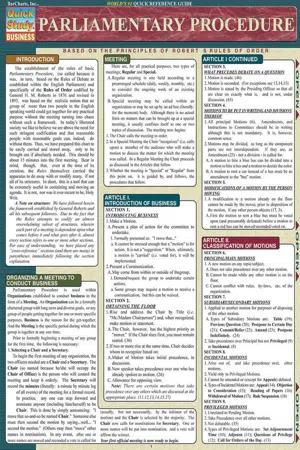
eBook - ePub
Parliamentary Procedure
This is a test
Buch teilen
- 44 Seiten
- English
- ePUB (handyfreundlich)
- Über iOS und Android verfügbar
eBook - ePub
Parliamentary Procedure
Angaben zum Buch
Buchvorschau
Inhaltsverzeichnis
Quellenangaben
Über dieses Buch
This guide outlines the basic concepts and principles of parliamentary procedures.
Häufig gestellte Fragen
Wie kann ich mein Abo kündigen?
Gehe einfach zum Kontobereich in den Einstellungen und klicke auf „Abo kündigen“ – ganz einfach. Nachdem du gekündigt hast, bleibt deine Mitgliedschaft für den verbleibenden Abozeitraum, den du bereits bezahlt hast, aktiv. Mehr Informationen hier.
(Wie) Kann ich Bücher herunterladen?
Derzeit stehen all unsere auf Mobilgeräte reagierenden ePub-Bücher zum Download über die App zur Verfügung. Die meisten unserer PDFs stehen ebenfalls zum Download bereit; wir arbeiten daran, auch die übrigen PDFs zum Download anzubieten, bei denen dies aktuell noch nicht möglich ist. Weitere Informationen hier.
Welcher Unterschied besteht bei den Preisen zwischen den Aboplänen?
Mit beiden Aboplänen erhältst du vollen Zugang zur Bibliothek und allen Funktionen von Perlego. Die einzigen Unterschiede bestehen im Preis und dem Abozeitraum: Mit dem Jahresabo sparst du auf 12 Monate gerechnet im Vergleich zum Monatsabo rund 30 %.
Was ist Perlego?
Wir sind ein Online-Abodienst für Lehrbücher, bei dem du für weniger als den Preis eines einzelnen Buches pro Monat Zugang zu einer ganzen Online-Bibliothek erhältst. Mit über 1 Million Büchern zu über 1.000 verschiedenen Themen haben wir bestimmt alles, was du brauchst! Weitere Informationen hier.
Unterstützt Perlego Text-zu-Sprache?
Achte auf das Symbol zum Vorlesen in deinem nächsten Buch, um zu sehen, ob du es dir auch anhören kannst. Bei diesem Tool wird dir Text laut vorgelesen, wobei der Text beim Vorlesen auch grafisch hervorgehoben wird. Du kannst das Vorlesen jederzeit anhalten, beschleunigen und verlangsamen. Weitere Informationen hier.
Ist Parliamentary Procedure als Online-PDF/ePub verfügbar?
Ja, du hast Zugang zu Parliamentary Procedure von im PDF- und/oder ePub-Format sowie zu anderen beliebten Büchern aus Business & Business General. Aus unserem Katalog stehen dir über 1 Million Bücher zur Verfügung.
Information
Thema
BusinessThema
Business General
Article III.Motions And Order Of Precedence
PRIVILEGED MOTIONS
SECTION 10.
SETTING ADJOURNMENT TIME
- Takes precedence over all other motions.
- Not Debatable when made while another motion is on the floor.
- Debatable when presented as a Principal Motion with no other motion on the floor.
- Should, but is not required to, be made with a provision for next meeting time.
SECTION 11.
MOTION TO ADJOURN
- Non-Debatable.
- Takes precedence over all other motions except (10) above.
- Cannot be made while someone else has the floor.
- Can be made after a vote has been taken but before results are announced.
- Can be for a "short term" adjournment used as a recess during long sessions.
SECTION 12.
QUESTIONS OF PRIVILEGE
- Take precedence over all other questions except those above.
- Not to be confused with Privileged Motions as a whole.
- Usually pertain to immediate needs extraneous to business on the floor such as questions of comfort (Turn on/off heat; Open/close windows; Eject rowdy observers; etc.).
SECTION 13.
ORDERS OF THE DAY
- Take precedence over all but the above.
- Usually used to get meetings back on track by reminding assembly of that which was scheduled to be discussed when an "out-of-order" motion or discussion has intervened.
- Can be over-ridden by a majority in circumstances where the motion before the assembly is felt to take precedence over the orders.
INCIDENTAL MOTIONS
SECTION 14.
MOTION TO APPEAL (QUESTIONS OF ORDER)
- Raises questions concerning some point of order within a motion.
- Takes precedence over the motion to which it refers.
- Must be decided by Presiding Officer without debate.
- Appeal can only be made at time of decision by Chair.
SECTION 15.
OBJECTIONS TO QUESTION CONSIDERATION
- Can only be made when Question is first introduced.
- Cannot be debated (35) or amended. (23)
- Purpose is to curtail unproductive or irrelevant questions.
- It is not used to close debate of relevant issues.
- Purpose is to curtail unproductive or irrelevant questions.
SECTION 16.
READING PAPERS
- A one-time reading of relevant papers may be requested purely for informational purposes.
- It cannot be used as a delaying technique to postpone vote.
SECTION 17.
WITHDRAWAL OF A MOTION
- If moved by the maker of the motion, is granted without debate unless such is called for.
SECTION 18.
SUSPENSION OF THE RULES
- Applies only to Standing Rules or Rules of Order.
- Cannot be amended or debated.
- Can only be used once in a meeting, but can be reintroduced in a subsequent meeting even if same should occur within the same day.
SUBSIDIARY MOTIONS
SECTION 19.
MOTION TO TABLE
- Temporarily postpones further action on a motion.
- Takes Precedence over other Subsidiary Motions. (7)
- Does not take precedence over Incidental (8) or Privileged (9) Motions.
SECTION 20.
MOVING THE PREVIOUS QUESTION
- Ends debate and calls for a vote on the pending motion.
- Cannot be amended or have subsidiary motion (7) added.
- Can be applied to Questions of Privilege (12) or other debatable motion.
- If approved then the Main question, as well as all Subsidiary Questions and Amendments on the floor, are voted upon in reverse order of their proposal.
SECTION 21.
MOVEMENT TO POSTPONE (TO A SPECIFIC TIME)
- Takes precedence over Sections 22-24 below, but yields to all relevant sections above.
- Postpones all aspects of the motion and debate until the stated time.
- If several motions have been postponed and the specific time for discussion has passed, the motions must be considered in the order to which they were postponed (i.e. Motions postponed to, say, Tuesday are discussed before motions postponed to Wednesday even if both Tuesday and Wednesday have passed and the discussion resumes on Thu...